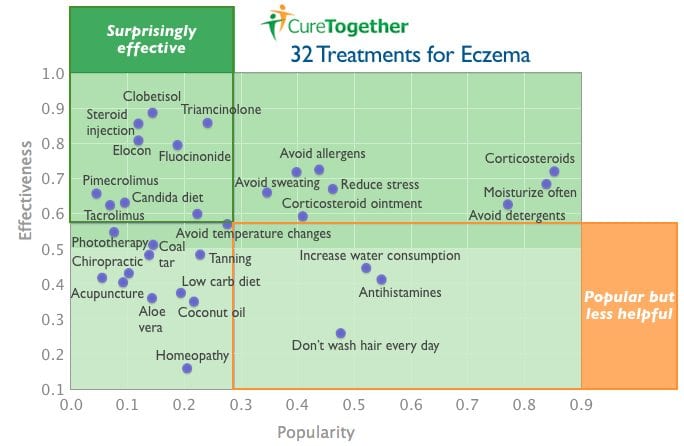 For the live-updated, fully-labelled, interactive version of this infographic, click here.
For the live-updated, fully-labelled, interactive version of this infographic, click here.
By Alex Carmichael, Co-Founder of CureTogether
People living with Eczema have reported that some of the most effective treatments for their skin include medications like Clobetisol, Trimacinolone, Elocon, and Fluocinonide. This is according to a new study by CureTogether, a free resource owned by 23andMe that allows people to share information about their health and treatments.
Participants in the study also said they found that simple interventions like avoiding allergens, avoiding sweating or temperature changes, moisturizing often, and reducing stress were also effective. They also said dietary changes help. Conversely, some common treatments such as antihistamines, coconut oil, and not washing hair every day were among the least effective, according to the study.
1. Clobetisol
2. Triamcinolone
3. Steroid injection
4. Elocon
5. Fluocinonide
6. Avoid problem foods
7. Avoid allergens
8. Corticosteroid cream
9. Moisturize frequently
10. Reduce stress
More than Just Cosmetic
According to the National Institutes of Health, Eczema affects 15 million Americans and 10% of young adults worldwide.
It can be embarrassing to experience cosmetically but also impacts people’s quality of life. Finding accurate recommendations on treatments that work well can be challenging, so CureTogether asked people living with Eczema to rate the effectiveness of 32 different patient-reported treatments.
Asking Patients
Where did this data come from?
This is the result of a four-year CureTogether study on Eczema, in which 1,109 people living with the condition shared information about their symptoms and what treatments worked best for them. We’d like to thank those who participated. And just as they shared their experience with treatments, we’re freely and openly sharing the results of the Eczema study.
This is part of a regular series of CureTogether research findings. CureTogether’s research findings are different than those made by 23andMe, which look at genetic associations with illness, traits and drug response.
But as we continue our work with the CureTogether community, 23andMe hopes to incorporate more of this kind of self-reported information into our own research. CureTogether present its findings just as they are – patient-reported data – to stimulate discussion and generate new insights for further research.
Please tweet, blog, or pass this along to anyone who can benefit or is interested in Eczema. Thank you!